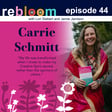
From Lens to Bloom: Calvert Crary on Creativity, Reinvention, and the Business of Flowers
This week on the ReBloom Podcast, we’re joined by Calvert Crary—owner of FlowerSchool, internationally recognized master educator, and author of Flower School: A Practical Guide to the Art of Flower Arranging and The Encyclopedia of Cut Flowers.
Calvert began his career as a lifestyle and fashion photographer before making a bold pivot into floral design in 2006. Since then, he has launched and led three successful flower businesses in New York City and become a trusted mentor to thousands of aspiring floral professionals around the world. Through immersive travel programs and hands-on workshops, Calvert shares his deep expertise, creative vision, and sharp business insight with a global community.
In this episode, Calvert shares his journey of reinvention, how he blends artistry with entrepreneurship, and what it takes to thrive in the floral industry today. Whether you’re a budding creative or a seasoned designer, this conversation is sure to leave you blooming with inspiration.
Website: https://www.flowerschoolny.com/
Instagram: https://www.instagram.com/flowerschoolny
YouTube: https://www.youtube.com/channel/UCwB8T0u_YX94aKuZTPjIvkg
Thank You to Our Sponsors: Jet Creative and UrbanStems!
· Jet Creative: A women-owned marketing firm committed to community and empowerment. Whether you’re launching a podcast or building a website, Jet Creative can help you get started. Visit JetCreative.com/Podcast to kickstart your journey!
· UrbanStems: Your go-to source for fresh, gorgeous bouquets and thoughtful gifts, delivered coast to coast. Treat yourself—or someone you love—with 20% off! Use code BLOOMBIG20 at checkout.



















